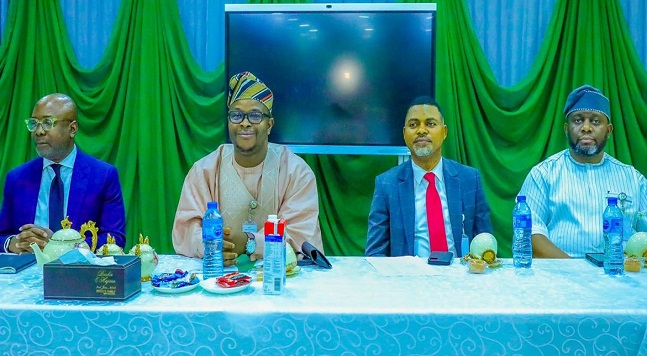Telecom
Infinix Partners Jumia, MTN as 5 Minutes Fast Charge ‘NOTE 3’ Is Unwrapped

Infinit Mobility, has added Note 3 to its profile as Africa’s leading mid-ranged smartphone brand with the most innovative product portfolio in 2016.
The brand received 2 awards in Nigeria for best smartphone brand of 2015/2016 from Beacon of ICT and also Titans of Tech.
The brand unveiled its latest smartphone ‘Infinix NOTE 3’ as the first ever smartphone with the remarkable 5 minutes charge function for users.
‘NOTE 3’ was ushered into Nigerian market with a launch event themed #JIMSbigthing in partnership with Jumia & MTN at Civic Centre, Victoria Island, Lagos.
The smartphone comes with more remarkable features which will delight all mobile phone lovers in Nigeria.
Apart from the highlighted five minutes charge for 200 minutes talk time, it also comes with 6inch HD screen, 4500mAh battery, Finger print recognition, 13MP back camera, 5MP front camera, water-cooling technology to prevent battery overheating.
The Fast charge feature is specially tailored to suit the unique needs of the African market, where customers need fully charged phones at all times to connect with family and friends!
The Infinix Note 3 is also preloaded with the latest Infinix User interface ‘XOS’. XOS comes with fast RAM speed, stylish wallpapers, efficient gestures, which allows users to optimize their Infinix smartphone.
Speaking about the launch of Infinix NOTE 3, Bruno Li, regional country manager Infinix Mobility, stated, “We are very proud of our latest smartphone NOTE 3 and also the partnership for JIM with Jumia & MTN 2nd year in a row. We intend to make history with Infinix NOTE 3’s 5 Minutes fast charge technology and we are sure the product will be welcomed by our users and fans in Nigeria.”
Customers can purchase the phone onJumia Nigeria. As strategic partners for Infinix NOTE 3 launch, the Jumia team will ensure prompt delivery to customers anywhere they are in Nigeria.
Speaking about the partnership, Thomas Simonet, head of Vendor Management, Jumia “Today, Jumia is incredibly proud to team up again with Infinix and MTN, offering Note 3 with MTN data bundle exclusive to Jumia. More than ever, we want to help our customers and fans to afford top quality product and data at unbeatable prices through an effortless shopping experience.”
On its part, Nigeria’s leading network, MTN continues to offer fast and reliable internet to its customers and this will enable Infinix NOTE 3 users to optimize their smartphone use with a 7GB data bundle for N2,000 or a 3GB bundle for N1,000 only. The offer is exclusive to Infinix Note 3 users and it is part of the MTN 100% bonus offer.
Speaking on this partnership with Infinix and Jumia, Richard Iweanoge, general manager of Consumer Marketing, MTN Nigeria, said, “the launch of this phone is coming at a time we have commenced the roll out of 4G/LTE services in the country. As such, we are excited about the possibilities that this phone brings to our customers. We also look forward to providing users with quality service and internet speeds that will enrich their digital experience.”
Telecom
Grey Expands Cross-Border Banking with USD Accounts, USDC Support

Grey, a cross-border payments provider, has rolled out USD business accounts, bulk payments, and USDC stablecoin integration on one platform to streamline international transactions for emerging market firms.

Grey
The upgrade lets businesses open USD corporate accounts, collect from global clients, and execute payouts to 170+ countries—including bulk transfers—in minutes, slashing World Bank-noted 6-7% fees, multi-day delays, hidden charges, and forex opacity.
Idorenyin Obong, Co-founder and CEO of Grey said: “Global banking access lags for high-growth markets; we’re bridging that with faster, transparent money movement regardless of client location.”
COO Joseph Femi Aghedo added: “Unpredictable payments stall growth—Grey cuts friction for payroll, suppliers, and partners, now with USD and stablecoins for broader reach.”
Launched in Africa in 2020 with US, UK, Europe presence and recent Latin America/Southeast Asia expansion, Grey offers multi-currency accounts, cheap transfers, virtual USD cards, expense tools, and strong security.
Telecom
GSMA Launches Innovation Fund to Accelerate Green Transition Through Mobile Technology

The GSMA yesterday announced the global launch of a new Innovation Fund offering grants of £100,000 to £200,000 to support small and growing enterprises using mobile and digital technologies to accelerate the green transition in low- and middle-income countries (LMICs).

The GSMA Innovation Fund for Green Transition for Mobile (the Innovation Fund), a GSMA-funded initiative supported by its members, builds on the GSMA’s commitment to advance inclusive and sustainable connectivity, and the mobile industry’s ambition to achieve net zero emissions.
The Innovation Fund will support commercially viable innovations that expand access to clean energy and promote circularity in mobile devices – including renewable energy solutions, smart metering, refurbishment models and responsible e-waste management – to advance digital inclusion and industry climate action.
The initiative aligns with the United Nations Sustainable Development Goals, recognising the critical role of mobile technology in enabling inclusive, sustainable development.
Targeting enterprises operating across Africa, Central and South America, and South and Southeast Asia, the Innovation Fund will focus on solutions that strengthen digital inclusion, affordability and socio-economic empowerment, while delivering environmental impact.
Philippe Bellordre, Acting Head of Mobile for Development, GSMA, said: “Through this Innovation Fund, we are investing directly in enterprises that are using mobile and digital technology to advance digital inclusion and enable a clean energy transition – while also scaling practical, circular solutions that extend the life of mobile devices and make connectivity more affordable for underserved communities.”
Driving circularity and improving handset affordability
Another core focus for the Innovation Fund is extending the lifespan of mobile devices through circular economy approaches, including repair, refurbishment and reuse, reducing e-waste while increasing access to affordable handsets for underserved populations.
The Innovation Fund will support solutions such as take-back and trade-in schemes, leasing models, refurbished device marketplaces, traceability tools, and responsible e-waste collection and recycling. By keeping devices in circulation for longer, these initiatives lower environmental impact while reducing the cost of ownership and expanding connectivity for low-income communities.
Building evidence for industry climate action
Beyond supporting individual enterprises, the Innovation Fund is designed to generate practical insights and lessons that contribute to the mobile industry’s wider climate and ESG priorities. This includes evidence that supports enabling environments for clean energy and circular economy solutions, informs policy discussions, and helps scale sustainable business models across emerging markets.
Who the Innovation Fund is for:
The Innovation Fund is open to for-profit small and growing enterprises with up to 250 employees that are:
- Operating in LMICs across Africa, Central and South America, or South and Southeast Asia
- Using mobile or digital technology as a core part of their solution
- Demonstrating commercial revenue and active users
- Able to contribute at least 25% matching funding
What the Innovation Fund provides:
Selected enterprises will receive:
- Grants of £100,000 to £200,000 over 15-18 months
- Technical assistance
- Support to connect with investors and build partnerships with mobile network operators
- Monitoring, evaluation and learning support
- Visibility through GSMA platforms, publications and industry engagement
Telecom
Prof. Adeyanju is Strengthening Nigeria’s Digital Backbone for a Connected Future in Two Years of Purposeful Leadership

Two years ago, the President of the Federal Republic of Nigeria, Asiwaju Bola Ahmed Tinubu (GCFR), appointed a new Executive Management Team at Galaxy Backbone Limited (GBB) and this marked a defining moment in Nigeria’s digital evolution.

Today, as the organisation marks the second anniversary of the appointment of four distinguished Nigerians; Prof. Ibrahim A. Adeyanju, as Managing Director/Chief Executive Officer, Honourable Olusegun Olulade, Executive Director Customer Centricity and Marketing, Muhammed Sani Ibrahim; Executive Director, Finance and Corporate Services and Olumbe Akinkugbe, Executive Director, Digital Exploration and Technical Services to Galaxy Backbone Limited, the story is not one of rhetoric, but of infrastructure strengthened, partnerships deepened, and national capability measurably advanced.
From the onset, the mandate was clear: to anchor Nigeria’s digital transformation on secure, sovereign infrastructure while improving service delivery across Ministries, Departments, and Agencies.
The Executive team immediately aligned execution with strategy through the launch of the Integrated Digital Transformation Strategy (IDTS) 2023 to 2028. The focus evolved from simply providing connectivity to leading a digital ecosystem that integrates infrastructure, platforms, policy alignment, value creation, and people.
Within two years, Galaxy Backbone significantly expanded national digital access. Broadband connectivity was delivered to nine underserved Local Government Areas under Project 774, extending inclusion to communities previously beyond reliable access.
Fibre-to-Hostel projects were completed at the University of Lagos, University of Abuja, and University of Jos, strengthening academic research and digital learning environments. Connectivity to strategic national assets, including the Nnamdi Azikiwe International Airport and key Federal Secretariats, was enhanced to improve operational efficiency and service reliability.
In a major step toward long-term resilience, GBB executed strategic business partnership with one of Africa’s leading provider of inter-connected carrier scale digital Infrastructure Companies, West Indian Ocean Cable Company (WIOCC), reinforcing Nigeria’s national fibre backbone, improving redundancy, and enabling scalable broadband expansion across more states and underserved communities.
This strategic move significantly strengthened the country’s digital resilience architecture.
Beyond infrastructure expansion, the leadership deepened Nigeria’s sovereign digital capabilities. The 1Government Cloud platform was optimized and expanded to support more MDAs with operational efficiency, secure hosting and shared services.
GovMail, a locally developed email solution by GBB, for Federal Government Public and Civil Servants was birthed and today is enhancing trusted government communication for over 100,000 professionals currently on the platform. Cybersecurity posture was reinforced through 24/7 monitoring and strengthened controls, while colocation services and data centre operations were upgraded for greater resilience. Under this leadership, GBB’s Service desk now operates 24/7, 365 days a year.
The deployment of Government as a Platform (GaaP) framework, improvements to the Government Service Portal, ISO recertification milestones and the implementation of an Integrated Management System (IMS) further institutionalized governance, accountability, and operational excellence.
The journey has not been without challenges. Fiscal constraints, legacy systems, increasing cyber threats, and rising expectations for digital public services required decisive leadership.
Through disciplined financial management, strategic partnerships, stronger stakeholder engagement, and operational reforms, the Executive Management stabilised systems, improved service quality, and positioned Galaxy Backbone as a trusted enabler of public sector transformation.
Support from the Honourable Minister of Communications, Innovation and Digital Economy, Dr. Bosun Tijani, the Secretary to the Government of the Federation, Senator Dr. George Akume who chairs the GBB Board, and the Head of the Civil Service of the Federation, Mrs. Didi Esther Walson Jack and other top Government leaders across the arms of Government, have all been instrumental in aligning policy direction with execution momentum, ensuring that national priorities translate into tangible digital outcomes.
Over the past two years, Galaxy Backbone has earned over 20 reputable recognitions, including the NET5.5G Pioneer Award, the inaugural Artificial Intelligence Award, the Overall Winner award at the Nigeria @ 65 Independence Kitty, the BPSR Website Performance Award, and Best ICT Provider Company of the Year at the International Standard Excellence Awards and so on. GBB’s MD/CEO, Prof. Adeyanju has also been named as one of the top 100 leading Personalities in the Telecoms Industry in Nigeria.
These honours reflect not just institutional visibility, but measurable transformation in governance standards, infrastructure resilience, and service delivery impact.
Two years on, Galaxy Backbone stands stronger — not merely as an infrastructure provider, but as a strategic custodian of Nigeria’s sovereign digital backbone.
With clarity of vision, disciplined execution, and sustained collaboration across government, the organisation continues to deepen connectivity, strengthen cybersecurity, expand cloud sovereignty, and build a resilient digital foundation for national development.
The progress achieved affirms a simple truth: purposeful leadership, aligned with national vision and supported by strategic partnerships, can translate ambition into enduring capability. Galaxy Backbone remains committed to powering a secure, connected, and digitally enabled Nigeria for generations to come.

 General News3 days ago
General News3 days agoZinox Technologies and TD Africa Forge Strategic Partnership to Revolutionize African Tech Ecosystem

 Telecom3 days ago
Telecom3 days agoUwaje Pays Tribute to Leo Stan Ekeh @70

 Telecom2 days ago
Telecom2 days agoCyber Immunity Emerges as Shield for Nigerians Amid Rising Scams

 E-Financial2 days ago
E-Financial2 days ago$214Bn Missing, Institutions Silent: Is Accountability Dead in Nigeria?

 General News2 days ago
General News2 days agoNITDA, Abia Partner on Enterprise Architecture Reform

 E-Business2 days ago
E-Business2 days agoInterswitch Partners Abia to Digitise Public Hospitals

 E-Business2 days ago
E-Business2 days agoWIEG 2026 Summit Shifts to April 22-23 for Maximum Impact

 News1 day ago
News1 day agoNITDA Urges Stronger State Partnerships as Key to Digital Economy Goals @ South-South Stakeholders Forum














